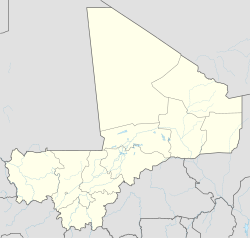| 2021 Mali bus massacre | |
|---|---|
| Part of the Mali War | |
| Location | Mopti Region, Mali |
| Date | 3 December 2021 |
Attack type | Mass shooting, arson |
| Deaths | 31 |
| Injured | 17 |
| Perpetrators | Suspected Islamist rebels |
On 3 December 2021 unidentified gunmen attacked a bus in Mopti, Central Mali, firing at its occupants and setting it on fire, killing 31 civilians and injuring 17. [1] Most of the passengers were women travelling from Songo-Doubacore to a market in Bandiagara. [2]
Contents
According to the local mayor of Bankass, during the massacre, the insurgents slashed the tires, proceeding to shoot the civilians to death, then set the bus on fire. [2] Malian authorities sent a group of state security officers to the crime scene, [3] where they found 25 burnt bodies in the vehicle's trunk. [4]
The massacre occurred on the same day that Islamist rebels attacked a convoy in the region, killing two United Nations peacekeepers. Two days later, unknown militants bombed two UN camps in Gao. [5] The attacks occurred during a recent insurgency among Islamist insurgents in West Africa. [6]
